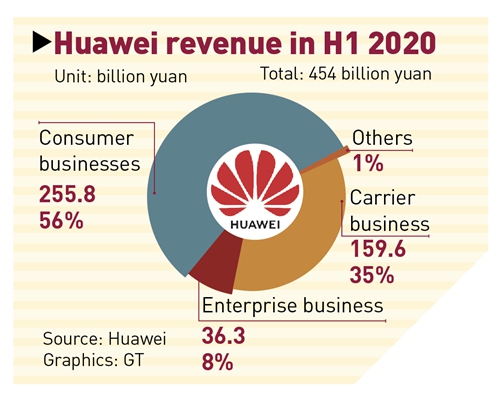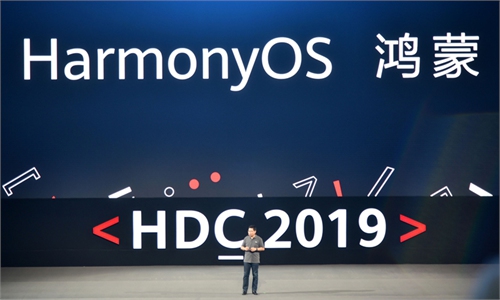SOURCE / INDUSTRIES
Time, talent what Huawei needs most in coping with US crackdown: analysts
Time, talent what Huawei needs most amid US crackdown

Richard Yu, CEO of Huawei's Consumer Business Group, unveils the HarmonyOS, or Hongmeng in Chinese, during the Huawei Developer Conference held in Dongguan, south China's Guangdong Province, Aug. 9, 2019. Photo: Xinhua
Chinese tech giant Huawei announced on Sunday it will hold the hotly anticipated Huawei Developer Conference 2020 in Dongguan, South China's Guangdong Province from September 10 to 12, but the much-awaited HarmonyOS smartphones will not be launched either during the conference or by year-end.
Amid the US' relentless crackdown on the rising Chinese telecoms giant, from cutting off its access to Google's Android updates to barring American firms from supplying chips to Huawei, the company will unveil the latest developments in its Huawei Mobile Services (HMS) Core 5.0 and updates about its proprietary operating system HarmonyOS at the September conference.
Media reports have speculated that smart watches, PCs and even tablets powered by HarmonyOS may be launched at the same time, but Richard Yu, head of Huawei's consumer business group, said there are "no plans" to release such smartphones this year. He made the comments at the Summer Summit of Yabuli China Entrepreneurs Forum in Qingdao, East China's Shandong Province on Saturday, adding that releases next year are possible.
Analysts said there is no need to release Huawei smartphones powered by the HarmonyOS at this point as the Android system is still functioning, hence, there's no necessity to intensify the conflict and challenge the Google-developed Android OS just ahead of the US presidential election.
"There is no technical problem in putting the HarmonyOS on Huawei smartphones, but it may be worthless at this point. We will wait and see if the US' crackdown on Huawei will ease after the US presidential election," Xiang Ligang, a veteran telecom industry analyst in Beijing, told the Global Times.
Xiang noted that despite intensified pressure, Huawei has forged ahead with its HMS ecosystem. According to Huawei, its HMS incentive program covers more than 1.6 million developers around the world and its cross-device services reach 700 million users.
Huawei developed the HarmonyOS to end its dependence on Android and the product has been in development for three years. As Huawei's license with Google has expired under US rules, industry participants had speculated the launch of the HarmonyOS smartphones might come as early as the end of the year.
"The highlight of HarmonyOS is its connectivity, which would be widely used in 5G equipment when the world enters the Internet of Everything era, so there is no urgency to put it onto smartphones," Ma Jihua, a veteran industry analyst and close follower of Huawei, told the Global Times.
In addition, new OS on smartphones means dramatic changes for users. If users have bad experiences, there will be great negative effects, Ma said, so the move should be cautious and the system must be mature.
As to how Huawei is dealing with the latest US chip supply ban, Yu on Saturday only said it is looking for a solution, without disclosing further details.

Taiwan-based integrated circuit designer MediaTek disclosed it has submitted an application to the US in accordance with relevant regulations, and hopes to continue to supply products to Huawei after September 15.
For Huawei, "a desire for survival" is inspiring the company to look for "self-salvation" paths, founder Ren Zhengfei said in a recent speech at four top Chinese technology universities, where he highlighted the importance of innovation and talent training for China's future technological development.
"Huawei also wanted to make some contributions after breaking into a no-man's zone and 'lighting a beacon' of 5G technology for the entire human race, but the US seriously hit us right after we 'struck a match,'" Ren said.
"What Huawei needs the most is time and talent," Ma said of the company's plight, and measures from the Chinese government may come soon.
"Probably, if some companies follow the US ban and cut Huawei's chip supplies, the Chinese government may plan to put them on China's unreliable entity list and thus probably influence the ban's impact," Ma added, saying that some people have underestimated the Chinese government's resolution to protect the legitimate rights and interests of domestic companies.


